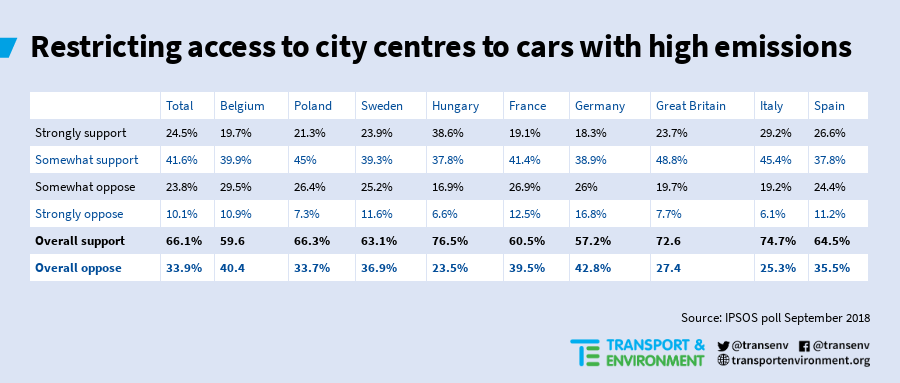Interested in this kind of news?
Receive them directly in your inbox. Delivered once a week.
The support for low emission zones is the highest in Hungary (77%), Italy (74%) and Great Britain (73%). But more than half of those surveyed in other countries also supported the bans: Poland (66%), Spain (65%), Sweden (63%), Belgium (60%), France (60%) and Germany (57%).

Exposure of high levels of diesel emissions following the Dieselgate scandal has contributed to a clear increase in low emissions zones. There are now 265 LEZs in place in 12 EU countries, of which 250 concern passenger cars.
Jens Müller, Diesel and Air Quality Coordinator at T&E said: “Low-Emission Zones are the fastest and most effective way to lower harmful levels of toxic air in our cities. People want to breathe clean air and demand action from politicians now.”
Three years after the scandal the number of grossly polluting diesel cars and vans on EU roads is continuing to grow and has now reached 43 million. But the scandal is turning off car buyers from choosing new diesel models as they shift to cleaner alternatives. The survey found 69% of EU citizens said it is “not too likely” (31%) or “not at all likely” (38%) that the next car they buy or lease will be diesel, mainly because of concerns over air pollution in their cities. This is underlined by the slump in recent sales.
With growing numbers of LEZs, older and more polluting diesel cars are being increasingly exported to countries in Central and Eastern Europe, as earlier T&E analyses of car exports to Bulgaria and Poland showed.
Jens Müller added: “Exporting second-hand dirty diesels east to places where there are no bans yet is shifting, not solving Europe’s toxic air crisis. We need national regulators to require carmakers to clean up the emissions, as well as coordination of these measures at European level. All Europeans deserve to breathe cleaner air.”
T&E together with Eurocities and the European Public Health Alliance will be holding the first ever European Diesel Summit on the 6th of November highlighting solutions to clean up the 43 million dirty diesel cars still on Europe’s roads.
Diesel engines are the main source of nitrogen dioxide emissions (NO2). According to the European Environment Agency, exposure to NO2 caused the premature death of an estimated 79,000 people across 41 European countries in 2015.


